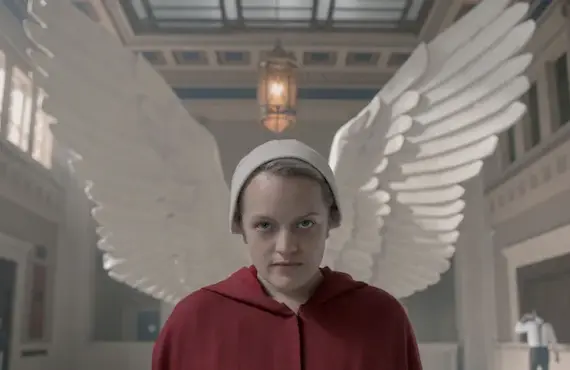I Wish The Handmaid's Tale Knew How to Quit Gilead
-
 Elisabeth Moss in The Handmaid's Tale (Hulu)
Elisabeth Moss in The Handmaid's Tale (Hulu)Spoiler Alert: This post contains spoilers from Season 3 of The Handmaid’s Tale.
I considered quitting The Handmaid's Tale so many times this season. Whatever compelled me to keep up with June Osborne (Elisabeth Moss) and the other women fighting to survive in the oppressive theocracy Gilead is long gone. At one point this season, I let myself get behind, only to binge four episodes of the Margaret Atwood adaptation in one sitting. To call the experience unpleasant would be an understatement.
And yet I pressed on, and I'll likelycontinue to press on through the already greenlit Season 4, because no matter how maddening the series gets, I know there's a better show lying within it. And I want to be around when showrunner Bruce Miller finally gets around to making it.
Season 3 promised to be the season of the #resistance. We would finally see June fighting back against her oppressors, joining rebellion effort Mayday, and saving her daughter Hannah from Gilead's clutches. We did eventually get there: Hannah's still stuck, but with Mayday's help, June saved 52 other kids from Gilead in the season finale. But it took quite a while to get there, with the season's first six episodes or so spinning their wheels. We saw June grow increasingly antagonistic toward her oppressors, while somehow avoiding any significant punishment for acting out. (Considering all that we'd learned about Gilead in the first two seasons, this stretched credulity to the max.) But actual action? We didn't get around to that until the back half of the season.
Meanwhile, up in Canada, The Handmaid's Tale's supporting cast — June's husband Luke (O-T Fagbenle), best friend Moira (Samira Wiley), and former partner-in-survival Emily (Alexis Bledel) routinely left us wanting more. Whenever the Gilead plots would grow rote and frustrating — which happened a lot, especially with anything that involved Fred (Joseph Fiennes) and Serena Joy Waterford (Yvonne Strahovski) — the story in Canada would keep my interest. Those bits, however limited they were, saw Emily reuniting with her wife (Clea Duvall) and struggling with her PTSD. They saw Luke and Moira fighting to protect June's baby Nichole from the Waterfords. In macro, they showed not just what comes after Gilead for its survivors, but what the rest of the world looks like in response to Gilead, from Canada’s efforts to save refugees, to Switzerland’s fear of Gilead’s militaristic might.
I want — no, I need — The Handmaid's Tale to move on. I wish it knew how to quit Gilead. Because the truth is, after 36 episodes I truly believe we've "got" Gilead. We understand it. We can continue to keep tabs on how radically villainous a nation it is — if you can even call it a nation — while moving our characters elsewhere. And on some level, it seems like The Handmaid's Tale gets it. Along with the 52 kids, June also got her friend Rita (Amanda Brugel) out, giving Team Canada another main character, while Fred and Serena Joy are also in Canada, being tried as war criminals. That means, of the main cast of eleven characters, six are no longer in Gilead.
Yet when it came time to either get out of Gilead or stay behind, June once again chose to remain. This is framed as a noble decision, in which June drew attention away from the others so they could get out safely. But after a first season finale in which it's implied June was getting out via her lover Nick (Max Minghella), and a second season finale in which she turned down the chance to get out with Emily, it's hard to see this decision as anything but stupid. It's stalling the story so we can spend more time with Janine (Madeline Brewer) and Aunt Lydia (Ann Dowd), even as their roles in the story become less important. It's keeping us with Nick, who hasn't appeared in the series since midseason, and Commander Lawrence (Bradley Whitford), who seeks redemption for helping create Gilead, but still lives comfortably with his own privilege. The Handmaid's Tale has bisected itself, but only one half of the story still feels fresh and compelling.
If Season 4 brings more of the same — 80% focus on Gilead, 20% on Canada — I may actually bow out. I still think it could return to being the terrific show it once was, but Miller and his team seem stubbornly set against ever leaving Gilead behind. The time has come to see what's happening in the rest of the world. I just need the makers of The Handmaid’s Tale to realize that as well.
People are talking about The Handmaid’s Tale in our forums. Join the conversation.Kevin O'Keeffe is a writer, host, and RuPaul's Drag Race herstorian living in Los Angeles.
TOPICS: The Handmaid's Tale, Hulu, Alexis Bledel, Amanda Brugel, Ann Dowd, Bradley Whitford, Bruce Miller, Clea DuVall, Elisabeth Moss, Joseph Fiennes, Madeline Brewer, Margaret Atwood, Max Minghella, O-T Fagbenle, Samira Wiley, Yvonne Strahovski
- Nick’s shocking betrayal in The Handmaid’s Tale season 6 episode 6 could be the final blow to June’s trust
- Beneath the cloak the dark symbolism of The Handmaid's Tale's red and white attire
- Star Trek: Discovery, Andor, and 23 More TV Shows That Are Ending in 2024
- Which Top Emmy Contenders Will Be Left Out of the Best Actress in a Drama Nominations?